- Home
- Shelby Foote
Love in a Dry Season Page 7
Love in a Dry Season Read online
Page 7
Major Barcroft’s office was the largest on Cotton Row. Drew had been warned in St Louis that the major was a crotchety but valuable client, so as soon as he had checked in at the hotel and had bathed and dressed, he went to call on him. “In Bristol see Major Malcolm Barcroft first,” they had told him. “He’ll expect it and so will all the others. That way no one’s offended. And mind you: dont call him Mister. Call him Major.”
It was late afternoon of a soft, summery November day, the town somnolent with the lull preceding closing-time. Clerks and proprietors drowsed on sidewalk chairs, their heads turning slowly in unison as Drew passed, bland eyes following him along the street. Major Barcroft was not in his office; the bookkeeper, who was late-middle-aged and wore a thick green isinglass eyeshade and bombazine sleeve protectors, said that he had stepped down the Row for a minute and would be back. Drew sat talking with the bookkeeper till the major came in. Then he rose and introduced himself: “Harley Drew. I believe the company wrote you I was coming: Anson-Grimm.” He put his hand out, stiff as a board, the thumb raised high, and the major touched it, noncommittal, watching from under his grizzled, tufted eyebrows. It was not actually a handshake, but it was as close as these two ever came to one.
Ten minutes later Major Barcroft looked sharply past Drew’s shoulder toward the door. His pince-nez glittered, the rimless lenses opaque on both sides of his narrow nose and beneath the high pale forehead, the roach of hair. Then he glanced at the clock, stood up, and closed his rolltop desk. He locked it, tested the catch, lifted his hat from the antler rack, and addressed Drew with an abrupt, peremptory nod: “Good day, sir.”
Drew rose, surprised and even awkward; it always came as a shock when anyone showed signs of not liking him. As the major came past, he turned and saw a young woman standing in the doorway. She was dressed in gray, with swatches of lace at her wrists and throat. Beneath the felt hat her hair, pulled so severely over her ears that the lobes protruded, was screwed into a tight knot at the base of her skull. Her eyes were a curious violet color and her face was unnaturally pale, as if she had not quite—or at best had just—recovered from a long illness.
“Evening, papa,” she said. Her voice was low.
“Amanda,” Major Barcroft said.
And that was all. She did not look at Drew. He watched them walk away, the major stiff and straight, his narrow shoulders drawn back so far that they made a crease in his coat between his shoulder blades, and Amanda slim and willowy beside him, almost as tall as her father. Dismounting from his high stool, the bookkeeper peeled off his sleeve protectors and tossed them onto the desk, where they lay like the cast skins of two snub blacksnakes. The sun was low; its rays came almost level through the window, throwing a green half-circle down the bookkeeper’s face until he removed the eyeshade and laid it alongside the bombazine snakeskins.
Drew stood in the doorway. “Has she been sick?” he said, not turning his head.
“That was Amanda,” the bookkeeper said. He was locking his desk, imitating the major. “Youre thinking about the other one.”
“Other one?”
“The other sister: Florence. Or dont you know? They keep her shut up in the attic or something; it’s kind of a secret.” He finished locking the desk, testing the catch as the major had done. “She aint got all her marbles. So Ive heard.”
“Oh?”
“Yair. They slide her meals under the door. Thats what folks say; I dont know. There used to be a lot of talk, but it kind of simmered down.”
“Oh,” Drew said. He said it as if he were not really attending, as if he had had to choose between looking and listening, and had chosen looking. Major Barcroft and Amanda were a block away by now, but Drew still stood and watched them; he had not turned to look at the bookkeeper. “Is that all, just the two daughters?”
“Well—there was a son, a peculiar little fellow, but he got his head blowed off one day a good while back. That was, lets see, fifteen years ago. Or was it sixteen? Sixteen. And the mother, of course, the major’s wife: she died when the boy was born. There’s just those three is all thats left of the high and mighty Barcrofts.” The bookkeeper watched him, quizzical and amused, faintly risible, as he pulled on his coat and fastened a patented black bow tie between the points of his celluloid collar, a crisper version of the major’s. “But dont be getting notions,” he said, moving toward the door. “It aint worth it.”
“I suppose not,” Drew said absent-mindedly. He was still watching; he was watching and thinking—it really came that fast. The bookkeeper laughed, for the first time out loud, and Drew turned from the doorway, puzzled. Then he laughed too. “I suppose not,” he said.
Next morning he made two calls, both of them brief, and then went for a walk around the town. The weather had held, Indian summer attenuated, still balmy after the mid-October cold snap. Trees kept their hectic leaves, like flames in the wind, awaiting the ultimate turning of the year, the rainstorm that would strip them and bring winter overnight. There was a sense of urgency in the air, the hesitant strain of a slowing wheel trying for one final revolution, the false, pregnant calm of dynamite fused and waiting for the shock. It was Saturday, the downtown curbings lined with country people wearing stiff, mailorder clothes, men and women mostly gaunt, and tow-headed stairstepped children whose cheeks bulged with the walnut-sized spheres of hard candy called wining balls. Negroes clustered on the sidewalks of the two blocks nearest the levee. Here were the cheaper clothing stores, and from time to time a clerk would appear in a doorway, peering hook-nosed and sinister out of an almost cavernous gloom, and invite them to enter, singly or in groups. If none of the Negroes stirred the clerk would come out, take one of them by the arm, and lead him inside with a show of good-natured cajolery. “I ask you, feel the quality of that goods,” those on the sidewalk would hear the clerk telling his captive. “Cheap at half the price, a downright walkaway bargain I give you my word.” And presently the victim would emerge, looking sheepish, carrying in both hands a paper-wrapped bundle hastily tied with string, and the clerk would come out behind him, pausing in the doorway to select another customer. Drew watched, amazed by what he thought at first was exploitation of the ignorant. He had not been watching long, however, before he recognized it for what it was: a two-way game, a contest. The baiting was being done as much from one direction as the other, and the end result was the same, no matter how it was reached; the Negroes had the merchandise, the merchants had the money.
Turning away from the business district, he walked toward a residential section where housewives in summery dresses stood at windows or on porches, brooms arrested on the back-swing or the follow-through, and watched him pass. Sometimes he walked fast; sometimes he strolled; sometimes he loitered, watching the squirrels romp and frisk in the trees and along the lightwires. When at length the barbered lawns and natty bungalows gave way to the grassless, packed-dirt yards and the squat unpainted boxlike cabins of factory workers, Drew turned back toward the hotel, a four-story building whose sign he saw every now and again through gaps in the sear and red and yellow leaves.
Though Amanda was nearly a block away when he first saw her, he recognized her almost immediately, a slim gray figure leaning slightly sideways to balance the weight of a market basket. Drew quickened his step. Within ten feet of her he stopped and removed his hat with a gesture that was almost but not quite a flourish. “Good morning, Miss Barcroft,” he said brightly, smiling above the hat which he held with both hands, upside-down, displaying the shiny satin of its lining; a fragrance as of heliotrope rose from it. He introduced himself with a shallow bow: “Harley Drew, and pleased to make your acquaintance. I’m a business friend of your father’s.”
She seemed frightened. When he took hold of the handle of the basket she gripped it tighter for a moment. Then their hands touched and she let go. “It’s only another block,” she said, covering with her other hand the one that had held the basket, the one he had touched; it was as if she were hiding the evid
ence of a kiss.
But he did the talking. “I like this town,” he said. “I really do. It’s so much better than the ones back home.” He paused, smiling down at her from under the halo of his hat brim. “Back home means Missouri: St Louis.” Then he waited for her to speak, like an experienced actor cuing an amateur.
“Everyone says how nice it is”—still hiding her right hand with her left“—but I dont know; I never saw any others.”
“Ah,” he said, combining sympathy and regret.
Now they were at the big gray house, which soared and loomed with its gingerbread trim and rococo cupolas. They turned in and Amanda stopped at the foot of the steps, holding out her hand for the market basket. They faced each other, scarcely a foot apart, and she could see the individual hairs of his mustache, the curve of his nostrils. “Thank you for helping me, Mr—”
“Drew,” he said promptly. “Harley Drew.”
She was flustered at his nearness as well as at having forgotten his name so soon, but in taking hold of the basket she remembered to grip the handle at one side: that way their hands did not touch. Though she had not quite recovered from her fright, he believed her eyes were softer. “Thank you for helping me—Mr Drew.”
“Glad to, maam.” He raised his hat with that same gesture, just short of a flourish. He was smiling and sunlight, filtered through the leaves of the four oaks in front of the house, lent his mustache the color of old gold. “I intend to see you again, with your permission. I’ll be here several days.”
She went up the steps almost at a run. Drew watched for a moment, then turned and walked away. Twenty yards down the sidewalk he stopped to light a cigarette. Then he glanced back over his shoulder, still holding the cupped flame, and saw Amanda standing in the doorway, watching him. This surprised him but he soon recovered; he smiled, removed the cigarette from his mouth, and was about to raise his hat again. But when she saw him looking back, she stepped quickly into the house and closed the door.
That was Saturday. Next morning he waited for her across the street from the church; he had meant to attend the service but he was late. He went into a restaurant and drank coffee, sitting at the counter and watching the church door through the plate glass window to his left. After two cups of coffee he came back outside and began to pace up and down like the sentinel which in fact he was. There was a peanut stand on the corner, locked for Sunday, and last night’s hulls crackled under his shoes. From time to time he heard singing from the church, sometimes by the choir alone, in which case he could distinguish the words, sometimes by the congregation too, in which case the words were garbled. Half a dozen pigeons pecked and strutted among the peanut hulls on the sidewalk. They were not only tame and unfrightened, they resented his being there and they let him know it, hardly bothering to swerve aside as he walked up and down. At length he inadvertently stepped on the foot of one of the birds. It gave a low-keyed squawk—and then, instead of flying off, merely backed up a step or two, standing firmly on its coral feet, and looked at him. Head turned sideways to display one perfectly round golden eye dilating and contracting with indignation, the bird began to scold him exactly as a person might have done. Drew stood there, astonished. Then he laughed, looking down at the pigeon, and the singing grew suddenly louder across the street. The doors of the church were open and the minister was marching out, followed first by acolytes bearing flags and the Cross and then by the choir chanting bravely in the sunlight. They wore vestments and they blinked like people emerging from a cave.
Amanda was among the last to come out, for the Barcroft pew was toward the front and the day was past when those in the rear pews were content to wait, except at such formal affairs as weddings and funerals. Drew watched as she awaited her turn to shake hands with the rector. Today her dress was black, but it appeared to have been cut from the same pattern and there were identical tabs of lace at her wrists and throat. Perhaps they were detachable, interchangeable, he thought. Then she was crossing the street and he saw that she wore a wider hat, with artificial tuberoses at the brim. He stayed carefully out of her line of vision and followed at some distance until the crowd thinned, getting into automobiles parked beside the restaurant and the motion picture theater across the street. When she was quite alone he overtook her. “Miss Barcroft,” he said, and surprise was in his voice.
“Good morning, Mr Drew.” There was none in hers. She looked at him, then quickly looked away, rather paler than yesterday but not at all surprised, and he realized that she must have seen him from the portico while waiting to compliment the rector on his sermon. So he dropped his pretense of surprise.
“I was late for church,” he said. “I thought I’d wait. I hoped you wouldnt mind.”
“Oh no”—her voice was tremulous.
But she would not look at him again and he found nothing to say. He was about to say ‘Lovely morning’ but dropped it as inane. Then suddenly he said it: “Lovely morning …” Amanda nodded but still said nothing. They walked in silence. They were halfway down the final block, within sight of the house, and he asked her to let him call that evening.
“I dont think I could do that,” she said.
“But I very much want to.”
Everything was strange about him, even his syntax. She kept her eyes down, her face turned away, avoiding his smile. He seemed to hover almost above her. She said in a low, choked voice, “I sit with Florence every evening.”
Drew had not expected her to mention the sister. He had a sudden vision of the two, the meek figure in black or gray and the mad woman, in an attic room with a low, slanting ceiling and barred windows and a rattly chain on the door. “Oh?” he said, too surprised to think of a reply. Then he tried to think, but it was interrupted; she spoke again.
“Sometimes after supper I take a walk …” She drew breath sharply, with almost a gasp of surprise at what she had said.
“What time?” It was a bit too insistent, too quick, and he reproached himself for not remembering that he had determined to be romantically bold but never brash. Then he was reassured; he had not overplayed it. For though she turned her head even farther away and began to walk faster, Amanda answered his question.
“Seven-thirty,” she said.
They were at the house now, the big gray dusty-looking structure with its wide veranda and tall windows. Amanda hurried past him and he stood watching her move swiftly up the steps. When she paused at the top and looked back, Drew saw that she was blushing: Like a bride, he thought. As the flush suffused her face, moving from her hairline down her throat and then inside the high neck of her dress, he had another vision: of flaming breasts, quite virginal, the nipples bright like drops of blood.
“—Until then,” he said, raising his hat.
From there he went directly to the telegraph office, where he found the telegrapher locking the door, on his way to Sunday dinner. “Caught me,” the man said, unlocking and holding the door ajar. “You got here just in time. Step in.” He stood aside while Drew drafted and pared the message to St Louis. Then he took it and tapped each word with the metal cap on his pencil: TOUCH OF FLU NOTHING DANGEROUS PROBABLY WEEK DELAY LETTER FOLLOWS. “Ten words,” the telegrapher said. “Sixty cents.—Feeling woozy?” he asked as he counted change. Drew just looked at him. “Rock candy and whiskey, and get in bed and stay there. In twenty-four hours youll be good as new; I guarantee it.”
“Thank you,” Drew said.
He walked to the hotel, had lunch, and went to his room. Taking off his suit to keep from wrinkling it, he lay on the bed all afternoon and looked at the water-marked ceiling. For a while he considered calling for the bellboy to send him a girl. But then he dismissed it; he put it out of his mind. Later the room grew dim. There were reflections from the street four stories below, the whine of traffic, with clashing gears and occasional horns as faint and sad as music in a dream. At six-thirty, when it was quite dark, he got up, switched on the overhead light, and dressed. He had a sandwich in the dining room, ea
ting rapidly in the clattering bustle of families out for Sunday supper. As he left he checked his watch with the clock on the lobby wall. It was seven-fifteen.
At seven-thirty, when Amanda came down the steps, she did not see him. Then something moved in the shadows and she saw him standing beside one of the oaks, his hat in his hands. By daylight the hat had been pearl-gray but now it was silvered with moonlight, like a helmet.
“Miss Barcroft.”
“Good evening,” she said. Her voice was so low he could barely hear it.
He was there the next night too. As they walked he told her about the war and his work, always with a suggestion of loneliness. He said he had fallen in love with the Deep South. “Elsewhere it’s so frantic,” he said. “But here a man can live. Do you see what I mean?”
She said she did. And Tuesday night, on the third of their nocturnal half-hour walks, he asked her to let him come into the parlor: “For a real visit,” he said. But she would not allow it.
“I couldnt,” she said. “I’m sorry, I just couldnt.”
Drew believed that this was because of the sister, the mad woman; he believed that Amanda did not want him to hear the screaming or gurgling or whatever it was maniacs did in the quiet hours of the night. He wanted to comfort her, to reassure her, to let her know that nothing in all this world could scare him away. ‘As if it mattered,’ he thought, alone again in the hotel room. ‘For all that goes with it I’d marry the crazy sister.’ But this was just talk, bravado: he was goading himself, accusing himself of a greater enormity in order that the lesser would appear that much the lesser, even to himself.
Yet the strain was beginning to tell—the flesh of his face had tightened like a mask; the smile was becoming a grimace. He took up the phone: “Send a bellboy up to 415.” The Negro came and stood beside the bed, his face expressionless while Drew told him what he wanted. “Dont send me any crow,” he said, lying there in his one-piece summer underwear.

 Chickamauga and Other Civil War Stories
Chickamauga and Other Civil War Stories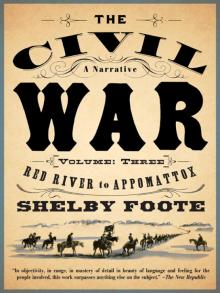 The Civil War: A Narrative: Volume 3: Red River to Appomattox
The Civil War: A Narrative: Volume 3: Red River to Appomattox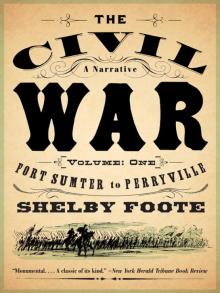 The Civil War: A Narrative: Volume 1: Fort Sumter to Perryville
The Civil War: A Narrative: Volume 1: Fort Sumter to Perryville Jordan County
Jordan County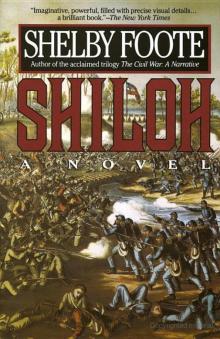 Shiloh
Shiloh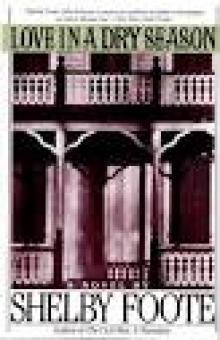 Love in a Dry Season
Love in a Dry Season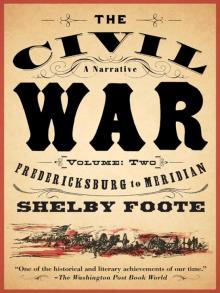 The Civil War: A Narrative: Volume 2: Fredericksburg to Meridian
The Civil War: A Narrative: Volume 2: Fredericksburg to Meridian Chickamauga
Chickamauga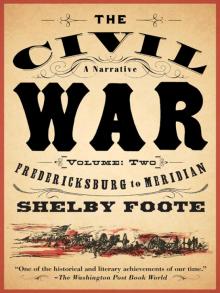 The Civil War: A Narrative: Fredericksburg to Meridian
The Civil War: A Narrative: Fredericksburg to Meridian